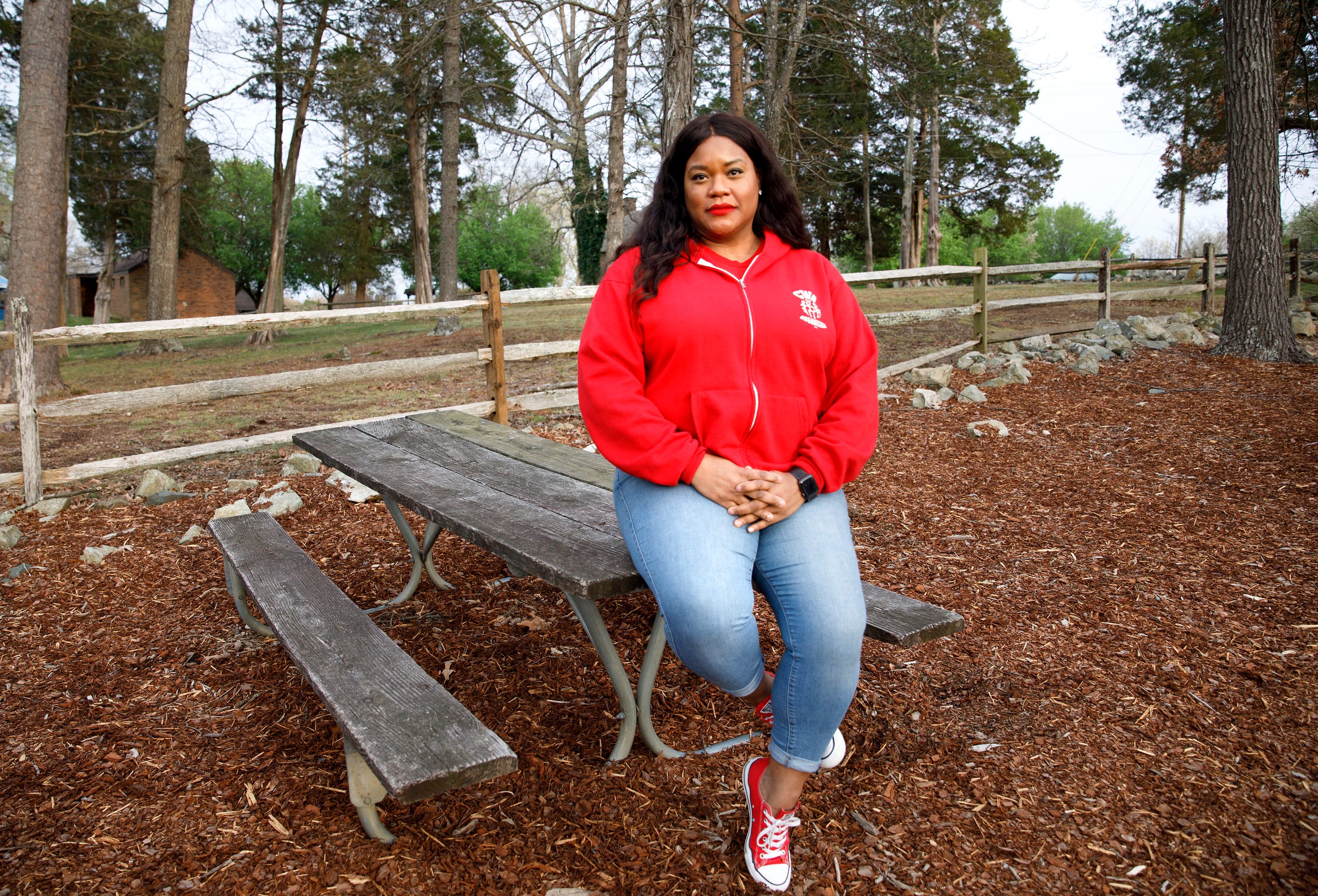Timmia McIlwaine began working as a customer service representative for a major airline 11 years ago, and she remembers often going nearly a month without handling a single angry call.
That was before the pandemic. Now, in addition to helping passengers rebook a canceled or missed flight, she must deal with fliers struggling to understand the health requirements for entering another country, or who are just generally on edge.
“It’s completely draining,’’ says McIlwaine, 41, who deals with hostile customers all day in nearly back-to-back calls. “I’ve been called racial slurs. … We have passengers who will pass the phone to someone else near them who’s very angry and the cussing session continues.’’
McIlwaine is one of roughly 3 million customer service agents in the U.S., more than 8 in 10 of whom say they've dealt with verbally abusive customers, according to a report from ASAPP, a company that develops artificial intelligence technologies to support service representatives. 
COVID-19 made high worker turnover worse
Roughly 1.2 million customer service agents, who resolve problems ranging from billing errors to rejected insurance claims, leave those positions every year. Abusive customers are a key reason why, according to the ASAPP report, conducted with the University of San Francisco, School of Management Master of Science in Marketing Intelligence program.
That revolving door became an even bigger problem during the pandemic, when call centers saw increased requests for help from consumers stuck at home, who were increasingly buying online and were unable to get assistance in person, according to ASAPP.
Wages have been on the rise to attract and retain more agents. But the training they need to deal with both customer problems and hostile interactions has been pared back in some call centers so representatives can start handling callers more quickly, says Michael Lawder, ASAPP's chief experience officer, who has run call centers, and been a service representative for companies like Samsung and Apple.
Now, amid a national labor crunch, service hubs are increasingly competing with businesses offering positions with better pay or working conditions, he says.
"People are leaving to make a little bit more money, or occasionally the same money, but with less stress,’’ says Lawder.
"It’s the exception, not the rule,'' he added, "but there definitely are those times where people are going to cross the line and the poor call service agent or contact center agent trying to help receives the brunt of that.’’
Angry customers drive workers out the door
Verbal abuse is most common, with 81% of call center workers saying they've dealt with such mistreatment, while 36% have experienced violent threats, according to the report, which surveyed workers in the summer of 2021. And 21% of female employees and 9% of their male counterparts say they have been sexually harassed by customers.
Call center workers make up 2% of the nation's labor force, and 63% say they enjoy their jobs, compared with 10% who don't, according to the report.
But for those who leave the job, angry customers are a key reason, along with inadequate training and technology and performance standards that some workers say are unreasonable, the report found.
The Communication Workers of America, which represents roughly 40,000 customer service workers said in an emailed statement that its members who work for airlines have been particularly impacted.
"Verbal and physical abuse against passenger service agents and customer service representatives have recently spiked,'' the union said. "Our members are mobilizing to increase awareness of the issue and address gaps in enforcement of existing laws against such abuse."
Airlines for America, an industry trade group, would not comment.
McIlwaine, a member of CWA, has recently watched many of her airline colleagues leave for other jobs.
"Nobody wants to clock in and get fussed at all the time,'' she says. "Why would they stay?''
After graduating from college during a recession, then being laid off twice, McIlwaine says she was glad to find her current call center job, which in addition to good pay and benefits, offered professional stability and the chance to do something she really enjoyed.
"It's very rewarding when you can help someone who's calling,'' says McIlwaine, who lives in High Point, North Carolina. "I’m able to find a solution for them and get them on their way.''
But since the start of the pandemic, her customer service team has been understaffed. McIlwaine says she and her co-workers have been working mandatory overtime, which tacks an additional four hours onto a full day. Except for two 15-minute breaks and one that lasts a half-hour, she is taking calls constantly.
She often has to brace herself. "I don't watch the news before I go to work because if there's a storm somewhere ... we're going to have angry passengers on the line,'' she says.
Many business travelers, grounded during the pandemic, have yet to return, says McIlwaine, so she is often dealing with people who fly less often and who are doubly upset that a canceled flight may jeopardize a long-awaited trip.
"The anxiety of not being able to go on this vacation gets unleashed on us because we're the face of the airline,'' she says. "It causes a lot of anxiety.''
For some, working in customer service is a stepping stone
Sarah Skaggs, 26, started working in customer service more than a decade ago because her first call center jobs didn’t require much experience. When she decided to move on to earn better pay, landing a new call center position was relatively easy.

She's answered calls for a company that did home remodeling and another that provided home security. Skaggs took her latest call center job at a bank with the hope that if she got her foot in the door, she'd eventually be able to climb the ladder and leave customer service behind.
Skaggs says most of the callers she's dealt with – needing overdraft fees waived for instance, or a fraud claim investigated – are perfectly fine.
"They're not overly nice,'' she says. "They're not rude. They're just there for one specific thing, and those are the calls I like the most.''
But she estimates that about 15% of the callers are unpleasant – or worse. "If you're not emotionally strong,'' she says, "you will not last.''
Skaggs remembers every detail of a call from a woman who told her she should commit suicide.
The customer was angry about a $10 charge on her credit card. Skaggs says she couldn't address the charge until it was posted, igniting the caller's wrath.
"I actually left work after that call, went home and cried,'' she says. "Some days are just a breeze. You don't get any bad calls, and some days are so bad that you genuinely want to die.''
She's dealt with many ugly threats.
"I've had people tell me I deserve to die,'' says Skaggs, who lives in Cincinnati. "I've had people say I should be raped. It's really easy to be nasty to someone you can't physically see."
While different businesses have different policies, Skaggs says her employers have not allowed her to hang up on callers. During training, Skaggs says, she's received only fleeting advice on how to handle abusive customers.
"They'll tell you they're ... mad at the company, not at you, so you shouldn't take anything they say personally,'' she says. "That logically makes sense. But when you're in the moment, and you have someone screaming at you because you won’t waive an overdraft fee ... there's no way you can really prepare for that.’’
Though calls are recorded and employees regularly review their interactions to determine if they could have handled them differently, Skaggs believes training can only go so far since situations and customers vary.
But Lawder says ongoing, targeted training, along with the authority to take certain actions without having to go to a supervisor or other employee for help, can make customer service work less stressful.
“If they don’t have the tools to solve the problem ... that is a fuse that can get lit,’’ he says. "At the end of the day, that's really all a customer wants, that somebody helps.''
Is it worth working in a call center?
The median wage for customer service workers was $17.23 as of May 2020, and median weekly earnings were $780 in 2021, according to the Bureau of Labor Statistics, though some sectors and states paid far more.
In addition to boosting training to handle the various problems customers face, service representatives can also be given tools to better deal specifically with abusive customers, Lawder says.
For instance, technology can let a representative know a particular caller has already contacted the company several times.
"Just knowing that this person called 20 minutes ago and is calling again at least prepares the agent for a customer who may be further down the line in terms of their frustration,'' Lawder says.
Employers may be legally required to intervene or address the impact of harassment, says Ron Zambrano, employment litigation chair at West Coast Trial Lawyers in Los Angeles.
Call center workers, for instance, can file a workers comp claim if stress from the job requires them to seek counseling or to take medication – costs their employer would have to cover, Zambrano says.
And if a customer calls repeatedly, attacking representatives based on their gender, race, or another aspect of their identity that is part of a protected class under federal law, employers who don't step in could be found liable for violating workplace anti-harassment laws, he says.
They might ultimately have to pay the affected employee financial compensation for emotional distress.
"By the second or third call, the employer is liable for that repeated offender harassment even though the caller is not an employee,’’ Zambrano says.
How do you survive a call center job?
The ASAAP report found that 78% of those surveyed felt businesses should have a policy allowing representatives to end a call with hostile customers.
But such policies could bring another set of problems, Zambrano says.
A call center worker might hang up on a customer who just happens to speak loudly, claiming they find their voice threatening, he says. Or a service representative might disconnect a caller they don't want to deal with because they have an accent.
"You can’t have these blanket rules where you can hang up whenever you want,'' Zambrano says.
However, service center managers and owners should have systems in place that identify employees most adept at handling hostile customers who can then immediately hop on the line and take over a call, he says.
They should also determine if an employee who constantly complains about rude callers needs additional training or maybe is just not able to handle the job, Zambrano says.
McIlwaine says that in addition to recurring training, her employer has tried to address stress and burnout by sending her and her co-worker's messages of appreciation and giving them reward miles that can be used to take trips.
But after particularly stressful calls, which can include helping distressed travelers trying to book a trip to deal with a death or other emergency, she would like to be allowed a moment to breathe before going on to the next customer.
"We need time in between calls to be able to decompress,'' she says.
Skaggs would also like to see abusive callers pay a price for their bad behavior.
"I wish they would close down peoples' accounts if they were super rude to us,'' she says, saying that even an automated communication warning to the customer could help.
Recently she was given a temporary assignment where she fixes errors on forms submitted by other customer service representatives.
Skaggs hopes she can do it permanently.
"I don't want to leave this position ever,'' she says. "I'm not on the phones, so it's great.''


